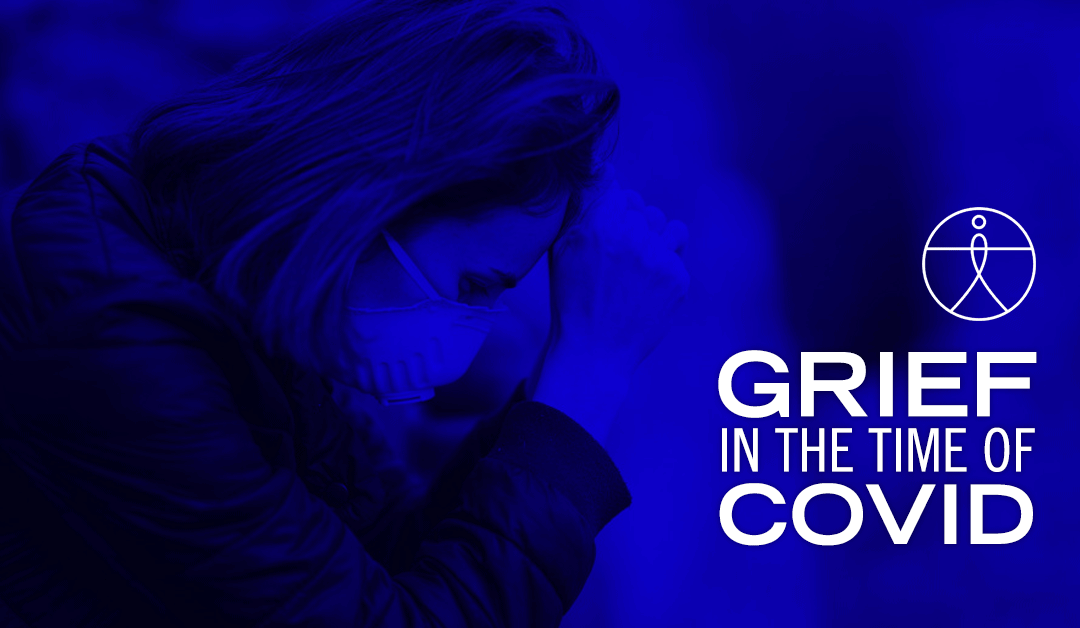Nearly a year into the global pandemic of COVID-19, there are many reasons to grieve. Over 420,000 Americans have died as a result of complications from the virus — a staggering loss, with more deaths ahead and deep repercussions we will not truly grasp for some time to come. Unemployment and financial hardship, brought about by businesses closing or bottom lines being tightened, add to our individual and collective grief. The lack of social contact for our youth (as well as adults) has all but stalled previously accepted relationships, acts of friendship, and formative experiences formerly taken for granted.
And now with mutated, more powerful variants coming into our communities before a proper vaccine distribution plan has truly begun for the original COVID-19 virus, it appears that we all have a long long way to go before we can literally breathe easier again.
How do we process grief when the hits keep coming? First, let’s take a dispassionate look at what grief actually is — perhaps then we can understand what it is we’re truly grieving, and how to recognize and work through the process as healthily as possible.
Defining Grief
Grief is an emotional response brought on by a profound sense of loss.
There are several stages of grief, each expressing itself uniquely to the individual grieving, featuring anywhere from four to twelve recognized stages involved. For the purposes of this examination, we will look into these five (also known as the Kübler-Ross model, from psychiatrist Elizabeth Kübler-Ross’s 1969 book On Death and Dying):
- Denial
- Anger
- Bargaining
- Depression
- Acceptance
Not all people grieving will experience these stages clearly, and not all in the order above. But there is an argument to be made that “acceptance” of grief as a natural process is the first step to truly be able to understand grief itself.
Traditionally, people have been able to grieve together, to share in each others’ loss and suffering.
Denial
When a tragic life event occurs, disrupting life as one has known it, the first thought can often be “This can’t be happening to me” or “I refuse to believe this has happened.” The numbed state of disbelief may be a physiological process of the body and mind, not unlike shock, from a host of overwhelming emotions. Denial is essentially a refusal to let go of a preferred and previously known life narrative — a coping mechanism.
Regarding COVID-19, denial that the virus even existed has struck even the most critical of patients, some even on their deathbed. Due to the unprecedented nature of the virus, as well as widespread misinformation, it was, for some, too large a shift in reality to comprehend.
Denial of the loss of everyday life before COVID-19, much less the loss of those fatally infected, is also to deny the grief that there is no going back to a world before it. Wearing a mask, for example, could be considered a sign of weakness to someone who had great confidence in their ability to withstand day-to-day reality.
“I’ll never get COVID,” “The virus is a hoax,” and “It will magically go away” are all examples of denial in the time of COVID-19.
Anger
Where denial is a coping mechanism, anger is known as a masking mechanism. The frustration that besets someone when denial is no longer an active ingredient in their day-to-day life is understandable. “Life has changed in ways I don’t like, and I am mad about it!” We’ve all been there.
Anger can be a more accessible emotion than the deeper emotions underneath, and can mask these more subtle feelings once there is no further denial. This anger may be redirected at other people, such as a person who died, the government, complete strangers, or a lost opportunity. One may even aim anger at inanimate objects: “These paper towels are to blame — life is unfair!”
While the rational brain knows the object of anger isn’t to blame, feelings in that moment are too intense to understand this. Anger may mask itself in feelings like bitterness or resentment. It may simply manifest as irritability. Not everyone will experience this stage, and some may linger here. However, as the anger subsides, one may begin to think more rationally about what’s happening and feel the emotions underneath.
Bargaining
During grief, one may feel vulnerable and helpless. In those moments of intense emotions, it’s not uncommon to look for ways to regain control or to want to feel like one can affect the outcome of an event. In the bargaining stage of grief, one may find yourself creating a lot of “what if” and “if only” statements.
Seeking a compromise with an unpredictable virus is surely not a rational response, yet aiming to strike a bargain with society, one’s community, or one’s faith could be an expression of this stage.
“I’ll only go to the store late at night,” “Thanksgiving and Christmas will be fine to get together with friends and family,” “I’ll just have one more cookie,” or “my kid really wants to see their friends, just this once” are all examples of grief bargaining during COVID. Each one of these bargains may help one make sense of emotions and falsely promote a return to day-to-day life, but this stage can lead to further grief if unintended consequences — such as contracting the virus itself — may come about as a result.
Bargaining is a tried-and-true human expression, often yielding positive results. However, during COVID, bargaining as a response to anger may lead to further complications in an already complicated time. Please remember to follow all mandated guidelines and speak to a professional to help deal with your emotions.
Depression
Whereas anger and bargaining can feel very “active,” depression may feel like a “quiet” stage of grief.
In the early stages of loss, one may be running from the emotions, trying to stay a step ahead of them. By the point depression rears its head, one may be able to embrace and work through them in a more healthful manner. This may express itself as depression in order to isolate oneself from others in order to fully cope with their particular loss.
To this end, as isolation appears to be one of the best ways to combat the virus, depression may well be more widespread than in any other time in modern history.
That doesn’t mean, however, that depression is easy or well defined. Like the other stages of grief, depression can be difficult and messy. It can feel overwhelming. One may feel foggy, heavy, fatigued, and confused.
“This is going to last forever,” “How am I supposed to follow my dreams?,” or “Why bother, it’s all ruined now” are clear examples of depression-related thinking.
Depression may feel like the inevitable landing point of any loss. However, if one feels stuck here or can’t seem to move past this stage of grief, talk with a mental health expert. A remote therapist can help work through this period of coping with grief.
Acceptance
And here we are, back at acceptance. Acceptance is not necessarily a happy or uplifting stage of grief. It doesn’t mean one has moved past the grief or loss. It does, however, mean that one has accepted it and has come to understand what it means in your life now.
We may feel very different during this stage. That’s entirely expected. There has been a major change in our lives, and that upends the way we feel about many things. Look to acceptance as a way to see that there may be more good days than bad, but there may still be bad — and that’s OK.
“I’ll make the most of what I have,” “I’ll make my way forward,” or even, “Hey, I’m trying my best” are all representations of acceptance of grief in this most challenging time. Even in pre-COVID days, these are admirable claims.
Adapting to this virus has been a grief generator for the entire world. Something so small has quashed dreams, jobs, entire nations, and destroyed families. But it has also equalized us. We have all grieved in the time of COVID, for ourselves, for each other, and for the concept of a “normal” world — a time before.
Accepting that there is no going back to the past, there is no “normal” to return to, and allowing ourselves to endure and engage with grief, work through these stages and understand our ability to do so, will keep us healthy in any time, no matter what happens today or tomorrow.
If grief is becoming a hindrance for you in your ability to function through these times or any times, please let Integrity Counseling help. Our counselors are available for remote sessions and take persistent grief seriously and with utmost care. Whatever stage you feel you’re in, you are not alone. We’re here for you. Call us at (919) 379-5788.

